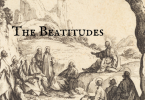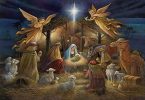32nd Sunday of Ordinary Time (Year A)
Scriptures: Wis. 6:12-16; Ps. 62:2-8; 1 Thes. 4: 13-18; Mt. 25:1-1
Today’s liturgy focuses on the topics of wisdom and our alertness, vigilance and preparation to meet the Lord. The first reading is taken from the Book of Wisdom. The book was written in 100 BC. The author of the book wanted his diaspora Jews who had settled in Alexandria, Egypt. Wisdom is portrayed in the Jewish scripters as a lady. The author wants to tell his fellow Jews to seek wisdom from their own scriptures. It is far superior to anything else. The diaspora Jews were influenced by the Greeks who were lovers of Philosophy. They felt that the gentile had all the wisdom. The message of the book is to seek wisdom in one’s life. It regulates our life on earth as well as life after death. It is same with God. Those who seek God, they prepare themselves well for the next life. One should not give up the search of God and His wisdom. One should patiently await to receive Him.
The second reading is from the first letter of St. Paul to the Thessalonica. It is one the earlier letter of St. Paul. St. Paul believed in imminent Parousia. The second coming of Christ will impact the lives of the faithful. They had many questions as some of their brethren who died without seeing the second coming of Christ. St. Paul carefully taught them that they need to be alert and the vigilant for the coming of Christ. He exhorted people of Thessalonica not to grieve over the dead because the Lord would bring them with Him. Once again St. Paul also tells us to wait patiently for the Lord’s coming.
In the Gospel, Jesus tells a parable of ten bridesmaids. It was a wedding feast, celebrated for almost a week. Thus, it became a great occasion for the entire community. According to tradition, the marriage ceremony would take place in the bride’s house. The bridegroom would come in procession to the bride’s house. The people would line up at the roadside to wish him God’s blessings. The invited would then enter into the house and the door would shut. It so happened that the bridegroom delayed. Since it was a night, ten bridesmaids were assigned to carry lamps. Five of them forgot to carry the extra jar of oil. They ran out of oil and went to buy it. Meanwhile, they missed the opportunity to enter into the bride’s house. In reality, they missed the opportunity to see the marriage ceremony as well as a week-long joyful celebration. The bridesmaids were expected to be alert and vigilant in their wait for the bridegroom.
The scripture scholars interpret this parable to high light the message of being alert and vigilant. The ten virgins represent the Church community who is waiting for Christ’s Second Coming. The Bridegroom is Christ. The wedding feast is the great and joyous occasion in which Christ comes for his Church. The delay of the Bridegroom corresponds to the delay of the Second Coming or Parousia. The closing of the door is the final judgment. The rejection of the five foolish maidens is the last judgement. The foolish maidens represent Israel and the wise ones the Gentiles. They failed to be alert and vigilant in their lives.
After thousands of years, we have been told to prepare ourselves for the second coming of Christ. We celebrate this mystery in the season of Advent which is approaching. We can use these readings to prepare for the great season. We are called to prepare ourselves to meet the Lord. We should be like the wise virgins who carried extra oil with them. The oil symbolises the power of the Holy Spirit, our relationship with God. We were blessed with the Holy oils at the time of baptism and confirmation. Our baptism candle was lit with the help of the priest, parents and godparents. We are called to keep our baptism candle burning. It is possible only when we determine to remain alert and vigilant in our spiritual life. Let us pray that this Eucharist strengthens us to adhere to this wisdom of God.






